To build hamstring size and strength, use a mix of exercises that train both hip extension and knee flexion, let you lift heavy through a full range of motion, and make it easy to get stronger over time.
There’s a lot of bad advice out there about how to strengthen your hamstrings.
Some say you don’t need direct hamstring exercises—squats are all you need. Others push fluff exercises like glute bridge marches, donkey kicks, or rowing sprints.
None of this will help you develop big, strong hamstrings.
This guide shows you how to train them properly, why targeted hamstring exercises matter, and how to build science-backed workouts that deliver real results.
Key Takeaways
- To build big, strong hamstrings, you need to train both of their primary functions—hip extension and knee flexion—with a mix of compound and isolation exercises.
- The most effective hamstring exercises are deadlifts, Romanian deadlifts, single-leg deadlifts, good mornings, hip thrusts, leg curls, and Nordic curls.
- Train your hamstrings with 10–20 weekly sets split across two workouts to maximize growth while avoiding excessive fatigue.
- Focus on getting stronger in every workout and take sets close to failure to ensure you’re training with enough intensity to spur growth.
- To speed up your results, use a high-quality protein powder to hit your daily protein target, creatine to boost recovery and growth, and a pre-workout to enhance energy, focus, and performance.
Table of Contents
+
Hamstrings Anatomy
The hamstrings are a group of three muscles on the back of your thigh:
- Semitendinosus
- Semimembranosus
- Biceps femoris
Here’s how they look:
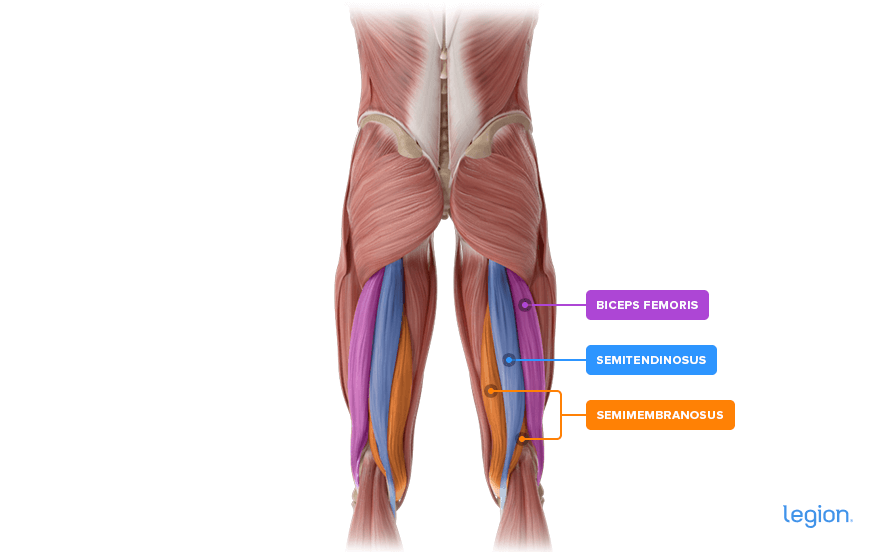
The biceps femoris has two sections or “heads”: the long head, which connects at both the hip and knee and helps move both joints, and the short head, which connects only at the knee and helps bend it.
Benefits of Hamstring Exercises
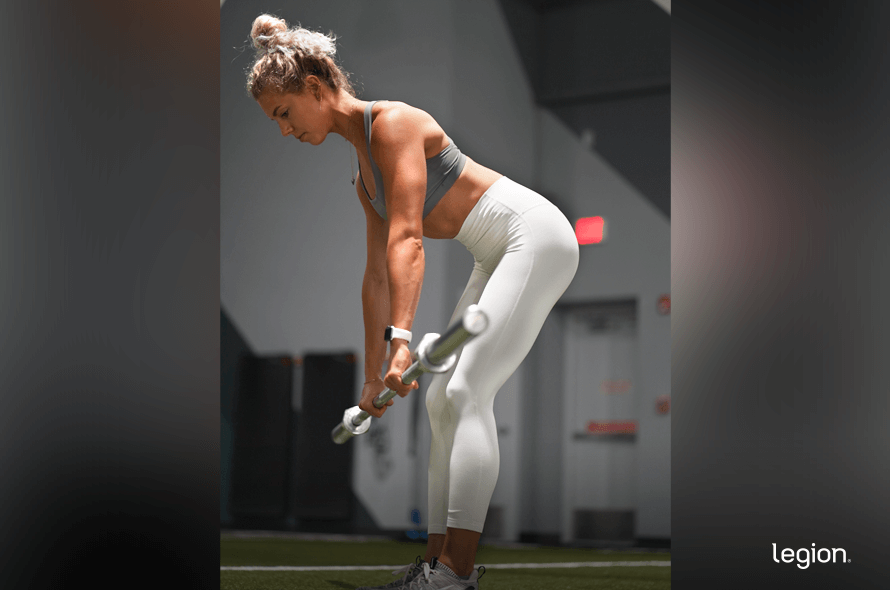
The hamstrings shouldn’t be just an afterthought—they’re essential for building strong, balanced, injury-resistant legs. Here’s why smart hamstring workouts matter.
Targeted Training
While many people think squatting alone is enough to develop all-around leg size, research shows that it doesn’t train your hamstrings enough to gain significant mass. And that’s why if you want to grow your hamstrings, you have to include hamstring exercises in your routine.
READ MORE: Do Squats Work Your Hamstrings? What Science Says
Fewer Hamstring Injuries
Many people injure their hamstrings when they stretch the muscle under high tension—like during sprinting.
Exercises that strengthen the hamstrings in these stretched positions, such as seated leg curls and Nordic curls, increase fascicle length (the length of muscle fibers) and eccentric strength, both of which are linked to lower injury risk.
Stronger, More Balanced Legs
Many gymgoers focus on training the lower body muscles they can see in the mirror—primarily the quads—but overlook those they can’t—like the hamstrings. The consequence is that they build an imbalanced physique, with big quads and flat hammies.
Prioritizing hamstring exercises helps you build strength and size evenly, giving your legs a more balanced, aesthetic look.
The 7 Best Hamstring Exercises for Leg Size and Strength
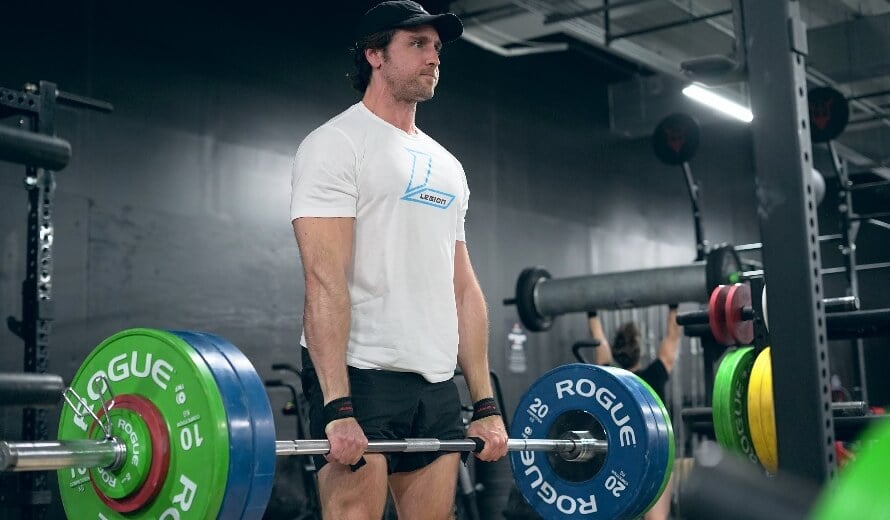
The next step in understanding how to grow your hamstrings is learning the best exercises for the job.
Below are the 7 best hamstring exercises to include in your hamstring-focused leg workouts. These exercises train your hamstrings through a full range of motion, let you lift heavy weights, and make it easy to implement progressive overload.
In other words, they’re ideal for gaining hamstring size and strength.
1. Deadlift
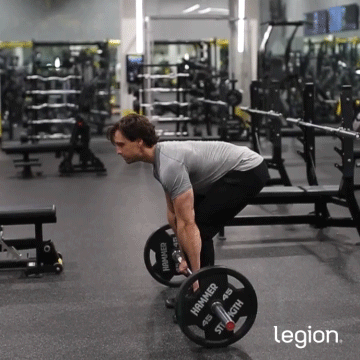
Why: The deadlift is arguably the best overall hamstring strengthening exercise. It trains nearly every muscle on the back of your body—including your glutes, spinal erectors, and especially your hamstrings.
Because it allows you to lift heavy weights safely and progress regularly, it’s a must-have in any effective hamstring workout.
How to:
- Stand with your feet slightly narrower than shoulder-width apart and your toes pointed slightly outward.
- Position a loaded barbell over your midfoot, about an inch from your shins.
- Grip the bar just outside your shins with both palms facing you.
- Flatten your back, brace your core, and push through your heels to lift the bar in a straight line until you’re standing tall.
- Reverse the movement and return to the starting position.
Sets, Reps, and Rest: 3 sets | 4–6 reps | 3–5 minutes rest
READ MORE: How to Deadlift with Proper Technique
2. Romanian Deadlift
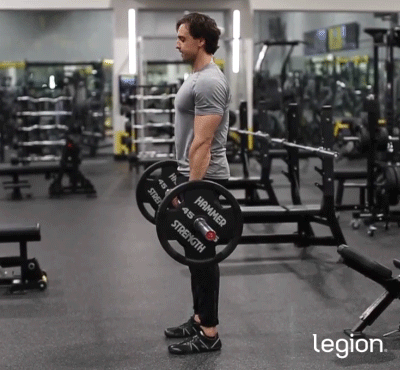
Why: The Romanian deadlift is one of the best hamstring exercises for mass because it trains many of the same muscles as the regular deadlift but causes far less fatigue, so you can do it more often without wearing yourself out.
How to:
- Stand with your feet hip-width apart and hold a barbell with a shoulder-width grip, palms facing toward you.
- Flatten your back and push your hips backward to lower the bar in a straight line toward the floor, keeping it close to your legs.
- Stop when you feel a deep stretch in your hamstrings or just before your lower back begins to round.
- Reverse the movement and return to the starting position.
Sets, Reps, and Rest: 3 sets | 4–6 reps | 3–5 minutes rest
READ MORE: How to Do the Romanian Deadlift: Form, Benefits, and Variations
3. Single-Leg Romanian Deadlift
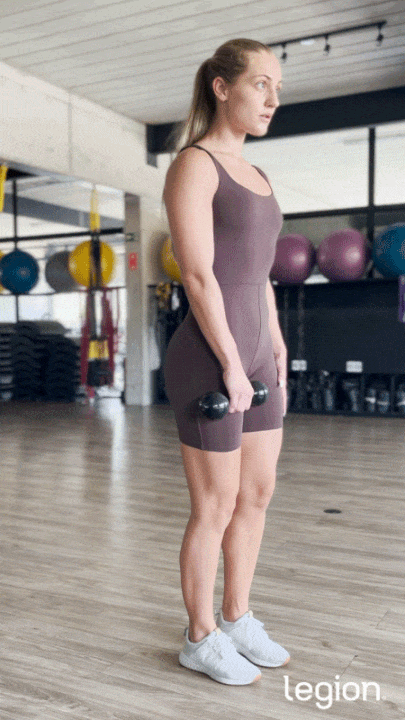
Why: The single-leg Romanian deadlift is a fantastic dumbbell hamstring exercise for building balanced strength and muscle. By working one leg at a time, you create a stronger “mind-muscle connection” with your hamstrings, which may boost muscle growth.
How to:
- Stand upright holding a dumbbell in your right hand in front of your right thigh.
- Flatten your back and push your hips backward while lowering the weight toward the floor in a straight line, letting your left leg extend behind you as a counterbalance.
- Stop when you feel a deep stretch in your right hamstring or just before your lower back begins to round.
- Reverse the movement and return to the starting position.
- Complete all reps on one leg, then switch sides.
Sets, Reps, and Rest: 3 sets | 6–8 reps | 2–3 minutes rest
4. Good Morning
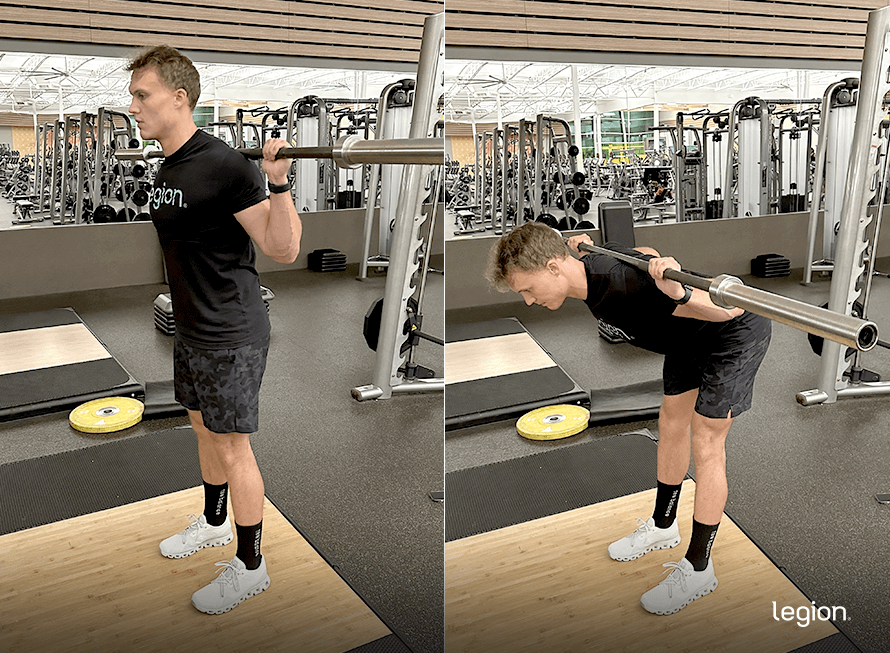
Why: The good morning is another solid barbell hamstring exercise because it allows you to train your hamstrings with heavy weights while stretched, which is a reliable way to stimulate hamstrings growth.
How to:
- Position a barbell across your mid traps and rear delts and your feet about shoulder-width apart.
- With slightly bent knees, hinge at the hips and move your butt backward to lower the bar in a straight line toward the ground.
- Stop once you feel a strong stretch in your hamstrings or just before your back begins to round.
- Reverse the movement and return to the starting position.
Sets, Reps, and Rest: 3 sets | 6–8 reps | 2–3 minutes rest
READ MORE: How to do the Barbell Good Morning: Form, Benefits, and Alternatives
5. Hip Thrust
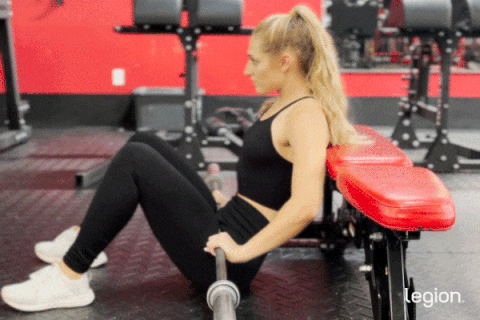
Why: The hip thrust is an excellent barbell hamstring exercise that also heavily targets the glutes. What makes it unique is that it keeps your hamstrings active through the entire range of motion, especially at the top where many other hip extension movements lose tension.
How to:
- Sit on the floor with your upper back resting against a bench positioned perpendicular to your body.
- Roll a barbell over your thighs so it sits in your hip crease.
- Plant your feet shoulder-width apart and 12–18 inches from your butt.
- Drive through your heels to lift the bar by extending your hips until your torso is parallel to the floor and your shins are vertical.
- Reverse the movement and return to the starting position.
Sets, Reps, and Rest: 3 sets | 6–8 reps | 2–3 minutes rest
READ MORE: How to Do the Barbell Hip Thrust: Form, Mistakes & Alternatives
6. Leg Curl
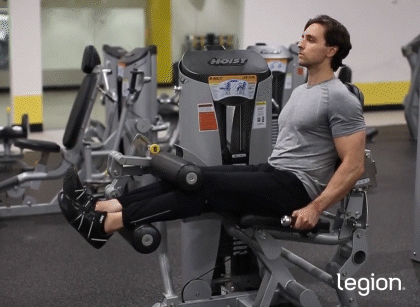
Why: Unlike most hamstring exercises, the seated leg curl trains your hamstrings through a full range of motion and while stretched, making it highly effective for gaining size and strength. It’s also easy to load, safe for beginners, and a great complement to more taxing exercises like deadlifts and RDLs.
How to:
- Sit on the leg curl machine with your knees just off the edge of the thigh pad.
- Adjust the heel pad so it rests just above your heels, across your Achilles tendons.
- Press your heels toward your butt until your shins are roughly perpendicular to your thighs .
- Reverse the movement and return to the starting position.
Sets, Reps, and Rest: 3 sets | 6–8 reps | 2–3 minutes rest
READ MORE: How to Do the Leg Curl: Muscles Worked, Form & Alternatives
7. Nordic Leg Curl
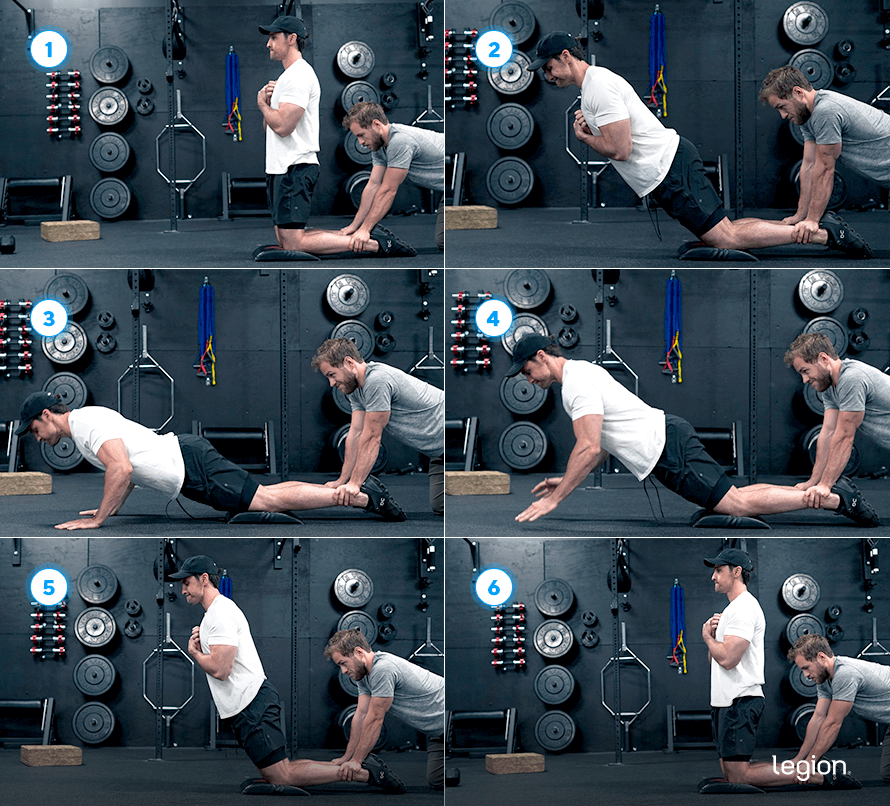
Why: The Nordic leg curl is a highly effective bodyweight hamstring exercise, yet it’s often overlooked. Research shows it significantly strengthens the hamstrings—particularly in their lengthened position—and may reduce the risk of hamstring injuries.
It also requires no equipment, so it’s an excellent choice for home hamstring workouts or for those training without machines or weights.
How to:
- Kneel on a padded surface facing away from your training partner or anchor point.
- Have your partner hold your ankles firmly, or secure your feet under something sturdy.
- Cross your arms over your chest, engage your core, glutes, and hamstrings, and maintain a straight line from your head to your knees.
- Slowly lean forward, using your hamstrings to resist the movement for as long as possible.
- Catch yourself with your hands just before reaching the floor.
- Push off with your hands if needed and use your hamstrings to pull yourself back to the starting position.
Sets, Reps, and Rest: 3 sets | 5–15 reps | 2–3 minutes rest
READ MORE: How to Do the Nordic Hamstring Curl: Alternatives, Benefits, and Muscles Worked
How to Program Hamstrings Exercises for Muscle Gain

Exercise Selection
To fully develop your hamstrings, you need to train both of their main functions: knee flexion and hip extension. That’s because different muscles in the group handle each movement.
The semitendinosus, semimembranosus, and long head of the biceps femoris connect at both your pelvis and near the knee, so they help extend your hips and bend your knees. The short head of the biceps femoris, on the other hand, only connects near the knee, so it only helps bend the knee.
If you skip exercises that involve bending your knees, one of your hamstring muscles will stay underdeveloped. Conversely, if you skip exercises that involve hinging at the hips, you miss out on the heavy lifting that drives regular progress and muscle growth.
Put simply, if you want to grow your hamstrings evenly and effectively, you need to include both types of exercises in your hamstring workouts.
Training Volume
To maximize hamstring size and strength, train them with 10–20 sets per week.
It’s not a good idea to do this all in one workout, though. A muscle can only tolerate around 6–10 sets in a single workout before its performance dips. When that happens, you lift less weight, for fewer reps, with worse form—all of which hinders your gains.
A better approach is to spread your weekly sets across two workouts. For example, do one hamstring-focused leg day containing 9–10 direct sets (from both compound and isolation exercises), then include 6–8 more sets later in the week during another lower-body or full-body workout.
Let’s look at how that might work in practice.
The Best Hamstring Workout Routine for Size and Strength
Below is a hamstring-focused leg day designed to add serious mass to the back of your thighs:
- Deadlift: 3–4 sets | 4–6 reps | 3–5 min rest
- Hack Squat: 3 sets | 4–6 reps | 3–5 min rest
- Hip Thrust: 3 sets | 6–8 reps | 2–3 min rest
- Leg Curl: 3 sets | 6–8 reps | 2–3 min rest
Remember, this is a hamstring-focused leg day workout, not a balanced leg routine. You shouldn’t use it as your only lower-body workout each week indefinitely.
Instead, use it as one of two lower-body workouts in your weekly split. On the other day, do a more balanced leg day that trains both your quads and hamstrings evenly.
Here’s how that might look:
- Squat: 3 sets | 4–6 reps | 3–5 min rest
- Romanian Deadlift: 3–4 sets | 4–6 reps | 3–5 min rest
- Leg Press: 3 sets | 6–8 reps | 2–3 min rest
- Nordic Leg Curl: 3–4 sets | 5–15 reps | 2–3 min rest
3 Tips to Optimize Your Hamstring Workout Routines
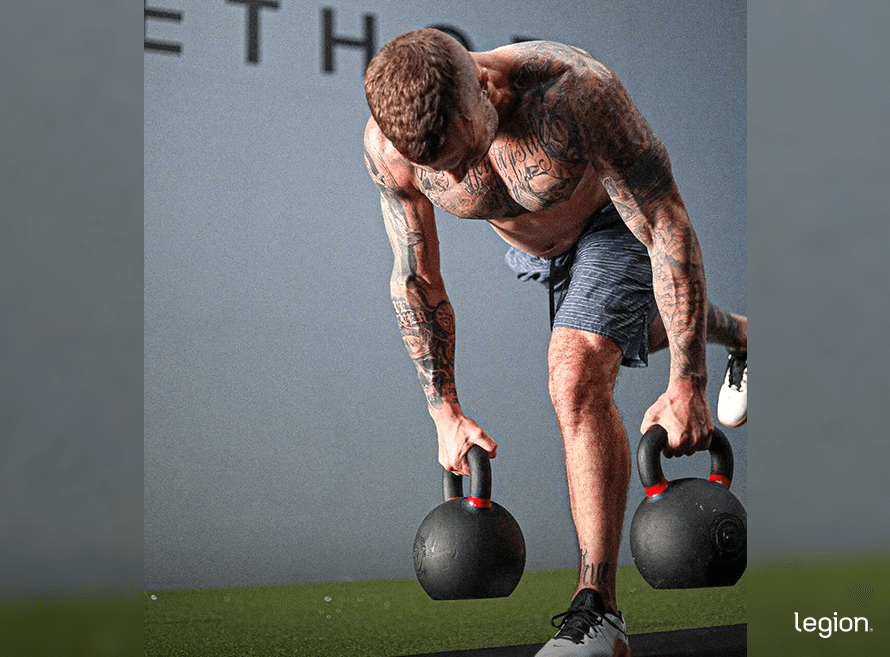
1. Train Close to Failure
As I explain in my fitness books for men and women, to maximize your results, you must take most sets of hamstring exercises to within a rep or two of failure.
Ask yourself at the end of each set, “If I had to, how many more reps could I have gotten with good form?” If the answer is more than two, increase the weight or reps to make your next set more challenging.
2. Progress Every Week
If your hamstring workout routine calls for 4–6 reps of the deadlift and you get 6 reps for a set, add 10 pounds to your next set.
If you manage 3 or fewer reps with the new weight, reduce the weight by 5 pounds to ensure you stay in the 4–6 rep range.
Follow this pattern of trying to add reps or weight to every exercise in every workout.
3. Use proven supplements.
These supplements can help you optimize your performance and gains while following a hamstring workout routine:
- Protein powder: Protein powder, such as Whey+ (Legion’s whey isolate) or Casein+(Legion’s micellar casein), provides your body with the nutrients needed to build muscle tissue and recover from your hamstring workouts.
- Creatine: Creatine boosts muscle and strength gain, improves anaerobic endurance, and reduces muscle damage and soreness from your workouts. For a natural source of creatine, try Legion’s creatine monohydrate, creatine gummies, or post-workout Recharge.
- Pre-workout: A high-quality pre-workout enhances energy, mood, and focus, increases strength and endurance, and reduces fatigue. For a top-tier pre-workout containing clinically effective doses of 6 science-backed ingredients, try Legion’s Pulse with caffeine or without.
Not sure what supplements to take? In less than a minute, the Legion Supplement Finder Quiz will tell you exactly what you need.
FAQ #1: What is the best exercise for your hamstrings?
There’s no single “best” hamstring exercise since the effectiveness of a hamstring exercise can vary based on individual goals and fitness level.
That said, most people regard the deadlift as the best hamstring exercise because it allows you to lift heavy weights safely and progress regularly, making it ideal for building mass and strength.
FAQ #2: Can I do home hamstring workouts?
If you want to train your hamstrings at home but don’t have access to equipment, bodyweight hamstring exercises like the Nordic hamstring curl and glute bridge are your best bet.
Dumbbell hamstring exercises, such as the single-leg Romanian deadlift, are also viable options if you have access to dumbbells.
FAQ #3: How many hamstring exercises do I need to do?
Doing 3–6 hamstring exercises each week is enough for most people. If you’re new to weightlifting or not looking to focus on hamstring development, doing 3 exercises is usually sufficient. For those looking to prioritize hamstring growth, doing 4–6 hamstring exercises will yield better results.
Scientific References +
- Ebben, William P. “Hamstring Activation during Lower Body Resistance Training Exercises.” International Journal of Sports Physiology and Performance, vol. 4, no. 1, Mar. 2009, pp. 84–96, https://doi.org/10.1123/ijspp.4.1.84.
- Kubo, Keitaro, et al. “Effects of Squat Training with Different Depths on Lower Limb Muscle Volumes.” European Journal of Applied Physiology, vol. 119, no. 9, 22 June 2019, https://doi.org/10.1007/s00421-019-04181-y.
- Timmins, Ryan G, et al. “Short Biceps Femoris Fascicles and Eccentric Knee Flexor Weakness Increase the Risk of Hamstring Injury in Elite Football (Soccer): A Prospective Cohort Study.” British Journal of Sports Medicine, vol. 50, no. 24, 16 Dec. 2015, pp. 1524–1535, pubmed.ncbi.nlm.nih.gov/26675089/, https://doi.org/10.1136/bjsports-2015-095362.
- Sumiaki Maeo, et al. “Hamstrings Hypertrophy Is Specific to the Training Exercise: Nordic Hamstring versus Lengthened State Eccentric Training.” Medicine and Science in Sports and Exercise, 6 June 2024, https://doi.org/10.1249/mss.0000000000003490.
- Schellenberg, Florian, et al. “Towards Evidence Based Strength Training: A Comparison of Muscle Forces during Deadlifts, Goodmornings and Split Squats.” BMC Sports Science, Medicine and Rehabilitation, vol. 9, no. 1, 17 July 2017, https://doi.org/10.1186/s13102-017-0077-x.
- Contreras, Bret, et al. “Barbell Hip Thrust.” Strength and Conditioning Journal, vol. 33, no. 5, Oct. 2011, pp. 58–61, https://doi.org/10.1519/ssc.0b013e31822fa09d.
- Yanagisawa, Osamu, and Atsuki Fukutani. “Muscle Recruitment Pattern of the Hamstring Muscles in Hip Extension and Knee Flexion Exercises.” Journal of Human Kinetics, vol. 72, no. 1, 31 Mar. 2020, pp. 51–59, https://doi.org/10.2478/hukin-2019-0124.
- Maeo, Sumiaki, et al. “Greater Hamstrings Muscle Hypertrophy but Similar Damage Protection after Training at Long versus Short Muscle Lengths.” Medicine & Science in Sports & Exercise, vol. 53, no. 4, 2 Oct. 2020, pp. 825–837, https://doi.org/10.1249/mss.0000000000002523.
- Ebben, William P. “Hamstring Activation during Lower Body Resistance Training Exercises.” International Journal of Sports Physiology and Performance, vol. 4, no. 1, Mar. 2009, pp. 84–96, https://doi.org/10.1123/ijspp.4.1.84.
- Cuthbert, Matthew, et al. “The Effect of Nordic Hamstring Exercise Intervention Volume on Eccentric Strength and Muscle Architecture Adaptations: A Systematic Review and Meta-Analyses.” Sports Medicine, vol. 50, no. 1, 9 Sept. 2019, link.springer.com/article/10.1007/s40279-019-01178-7, https://doi.org/10.1007/s40279-019-01178-7.
- Afonso, José, et al. “The Hamstrings: Anatomic and Physiologic Variations and Their Potential Relationships with Injury Risk.” Frontiers in Physiology, vol. 12, no. 12, 7 July 2021, pmc.ncbi.nlm.nih.gov/articles/PMC8294189/, https://doi.org/10.3389/fphys.2021.694604.
- “Set Volume for Muscle Size: The Ultimate Evidence Based Bible.” Weightology, weightology.net/the-members-area/evidence-based-guides/set-volume-for-muscle-size-the-ultimate-evidence-based-bible/.
- Stokes, Tanner, et al. “Recent Perspectives Regarding the Role of Dietary Protein for the Promotion of Muscle Hypertrophy with Resistance Exercise Training.” Nutrients, vol. 10, no. 2, 7 Feb. 2018, p. 180, www.mdpi.com/2072-6643/10/2/180/pdf.
- Eckerson, Joan M., et al. “Effect of Creatine Phosphate Supplementation on Anaerobic Working Capacity and Body Weight after Two and Six Days of Loading in Men and Women.” The Journal of Strength and Conditioning Research, vol. 19, no. 4, 2005, p. 756, https://doi.org/10.1519/r-16924.1.
- Bassit, Reinaldo Abunasser, et al. “Effect of Short-Term Creatine Supplementation on Markers of Skeletal Muscle Damage after Strenuous Contractile Activity.” European Journal of Applied Physiology, vol. 108, no. 5, 3 Dec. 2009, pp. 945–955, https://doi.org/10.1007/s00421-009-1305-1.










